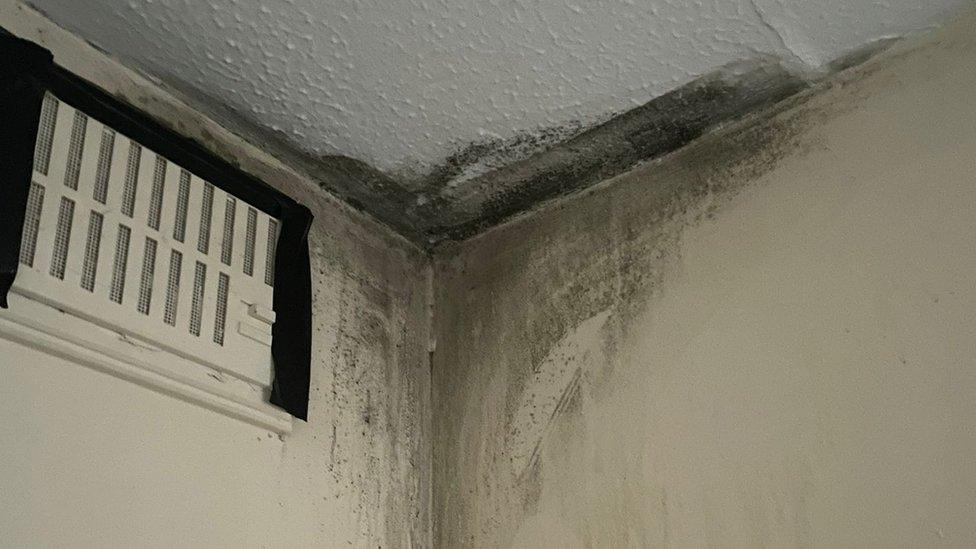Military personnel 'to quit' over housing rules
- Published

Military officers and senior soldiers have said they will quit the Army in droves over new accommodation rules.
Currently, military personnel are entitled to subsidised housing based on their rank, but the Ministry of Defence (MoD) wants to change the rules to focus on families' needs.
The plan could mean many officers will lose entitlement to larger housing.
It is feared the crisis in army recruitment and retention could get worse if the new plans are implemented.
The BBC has obtained testimony from more than 20 officers and their partners - in a sign of growing protest over the new policy.
One said: "Signed off before Christmas and changes to service family accommodation was one of the factors that influenced us as a childless couple".
Dozens more said they were ready to "walk out the door".
More than 300 officers took part in a survey on social media and 78% said they would be prepared to leave if their accommodation entitlement is reduced.
An online petition calling for a review of the policy has already received 18,000 signatures.
The MoD will launch its New Accommodation Offer (NAO) for military personnel in March.
Under the new offer, a married major with no children would be entitled to a two-bedroom property instead of a three- or four-bedroom house - leaving them with around 38% less space.
A married private with three children will get a larger house - gaining around 27% more space.
Rosie Bucknall, the wife of a major, said in theory it sounds like a great initiative "but in practice it adds further stress and uncertainty for families constantly on the move".
She and her husband currently live in a three-bedroom military house, but under the new rules they would be entitled to a two-bedroom flat.
Many officers and their families see it as the removal of one of the last remaining perks to deal with the unpredictability of service life - which sees many posted to different locations every few years.
Most of the testimony obtained by the BBC has been given anonymously. One lieutenant colonel said: "Based on the new accommodation model, we have decided that remaining in service is no longer a tenable situation for us".
Another lieutenant colonel said: "I have started to consider leaving since the announcement of this policy. It's the removal of another perk, and the pros no longer outweigh the cons."
An army captain said: "I could conceive of no single policy better placed to drive quality officers out of the service and tear the heart out of the organisation".
He added that he was planning to resign within the next two years, saying: "Anecdotally, most of my peers are also now planning to leave on varying but similar timetables".
Among those affected include many experienced soldiers who've been commissioned as officers after rising through the ranks.
One said: "Joined at 16, given my adult life and had real aspirations to be a lifer… but I feel as though the aspirations I had have been taken away from me by this policy, it feels like a punishment".
He said that several of his cohort were also now considering leaving the Army.
Several officers and their wives said the new accommodation policy would also have a devastating impact on family life, with grown-up children now no longer being able to return to a place to call home.
One officer said: "I have a boy and girl just over the age of 18. Knowing I'd be allocated a three-bedroom house meant we could still get a family home. This policy changes it."
The wife of another officer said the policy would make life harder as they had children with special needs and needed the extra space - with parents often visiting to help out.
In a statement the MoD said the NAO "will make provision fairer through allocating accommodation on need, not just rank and recognising long-term relationships".
The MoD said the new rules will also allow soldiers to access the private rental market as an alternative, but in practice any private landlord would have to agree to strict MoD terms of ending a lease at short notice. It also said there will be a three-year transition period and during that period no-one will be left worse off.
But the underlying problem is a shortage of adequate military accommodation and there has been growing dissatisfaction with the state of military housing.
Mrs Bucknall said the MoD's decision to commit to meeting a big increase in demand, without making changes to the supply of homes, was "madness".
An MoD survey last year found fewer than half of personnel were satisfied with the overall standard of accommodation. More than a quarter said it was a factor influencing decisions to leave.
Some families have been living in damp and poorly maintained military quarters.
For many this latest policy is the final straw. Another officer wrote: "The negative impact on our family is too much now, and sadly this is going to push us to look at leaving the military."
Related topics
- Published14 December 2022

- Published19 October 2023
